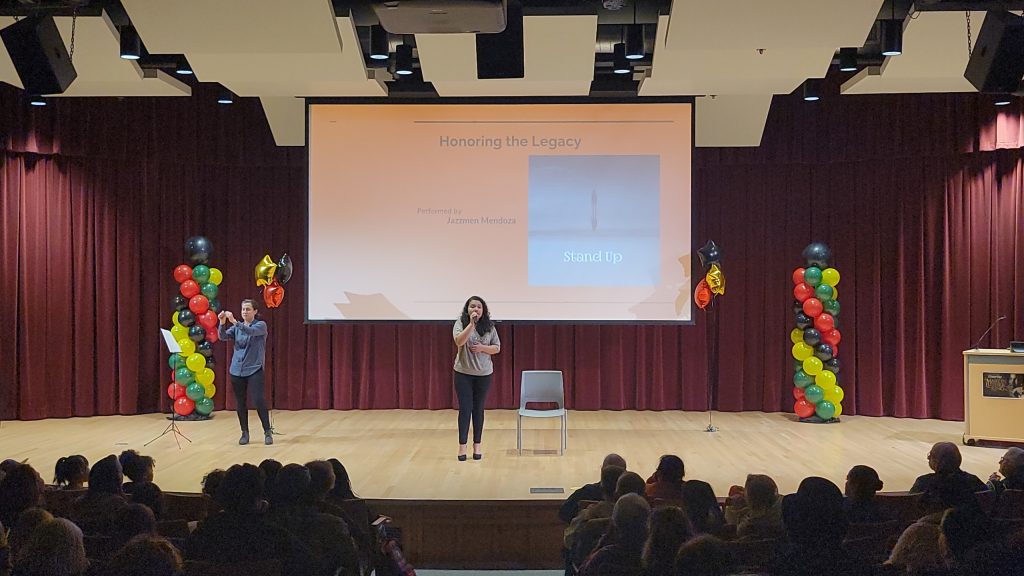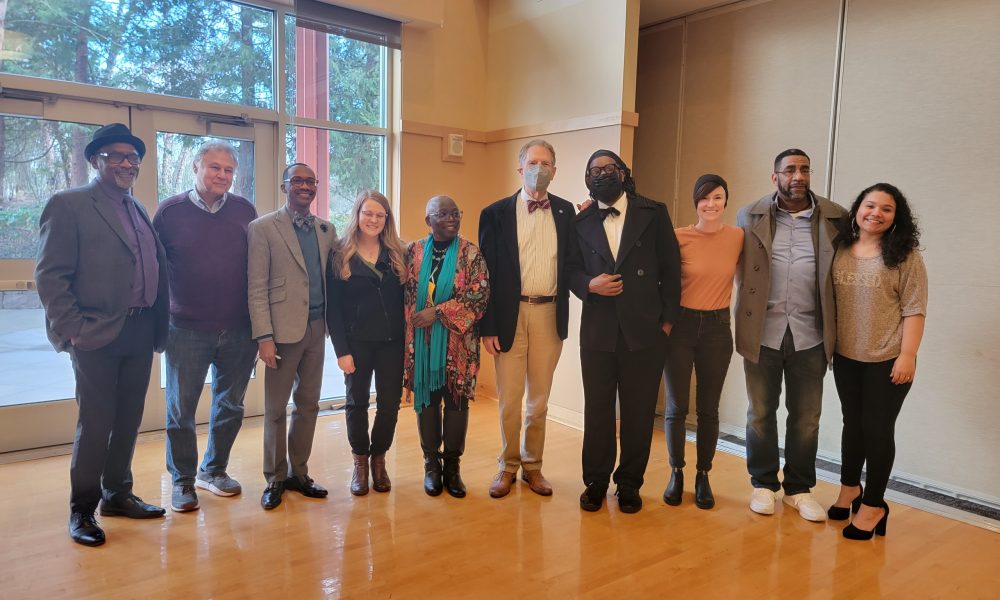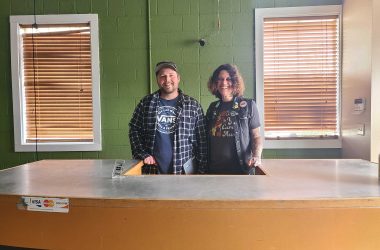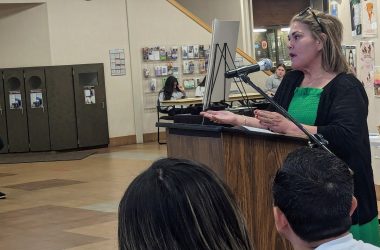General Drako vividly recalls the civil rights era in Alabama.
Drako, whose legal name is Earl Drake, grew up in the projects of Montgomery, behind Rev. Dr. Martin Luther King Jr.’s house. His father was a friend of King’s, he said.
As a child, he watched civil rights protesters march down the street past his childhood home, holding signs.
“Those moments and memories, for me, I take with me every day. I have pictures in my phone, every time I go home I go sit on those same steps of his house. I sit on those steps, and I thank God for him giving me an opportunity to dream,” Drako said.
He recounted those experiences on Monday as he joined about 200 who attended the Salem-Keizer NAACP’s event celebrating Martin Luther King Jr. Day. The event addressed King’s legacy, including misconceptions about his beliefs, and discussed where Salem’s Black community stands today.
The gathering included a keynote address from Rev. Dr. Osagyefo Sekou and remarks from RJ Hampton, president of the Salem-Keizer NAACP, and Salem Mayor Chris Hoy. Several young Salemites performed music and poetry.
Drako moved to Salem around six years ago and started the local radio station KSOS, or The Soul of Salem. The station focuses on community programming and empowering people of color in the area.
He said that with more events celebrating Black history and culture, and more involvement in local government, he believes Salem can become a model for Black representation in mostly-white communities.
Since the pandemic, Martin Luther King Jr. Day celebrations have been limited or remote. Hampton told Salem Reporter before the event that having the celebration live at the Salem Library’s Loucks Auditorium felt beautiful – “like a new day.”
“Any chance we get to be able to bring the city together, especially when it’s for something positive, a good cause, not because we’re reacting to something that’s taken place, that’s the charge that we want to start leading,” Hampton said.
During his speech, he critiqued the romanticized made-for-tv version of King that has become associated with the holiday.
“The ‘I Have a Dream’ speech, it’s not about the vision from the mountaintop, of lush and beauty, that one day we’ll maybe get to enjoy. It was about a continued struggle of having been left behind but still holding our heads high,” he said.
Hampton’s speech highlighted Black leaders in Salem, both historically and today.
In 1900, he said there were only 11 Black residents in Salem, four of whom were in mental institutions. The population grew, and the Black populace fought for education and a place in the city.
“You come into a community, and you don’t complain, and you don’t get down and look around at what’s going wrong – pack your stuff up and leave. You make it your home. And you make it a home for everybody that’s suffering,” he said.
He projected the names of notable Black Salemites (listed at the bottom of the article), and invited the audience, especially young people of color, to research and take inspiration from them.
“A rising tide raises all boats, and no one can hold me down without staying down with me. And so our only choice is to drown or rise together,” he said.
Hampton said the renaming of Salem Parkway to Dr. Martin Luther King Jr. Parkway serves as a tangible reminder of the community’s progress, and continuing struggle. The road was renamed in September by action of the Salem City Council.
Hoy gave remarks at the presentation, and several representatives from the city and Salem-Keizer School Board were present, as well as state Sen. Deb Patterson, D-Salem, and Salem Police Chief Trevor Womack.
Hoy said the street renaming was long overdue, and one of his proudest moments on city council.
“The amount of, and depth of, vitriol and hate I received since introducing that motion only serves to steel my resolve that it was absolutely the right thing to do,” he said. “And that we have a lot of work ahead.”
Hoy said the city has worked to support equity in jobs, contracting and climate action, and works closely with the city Human Rights Commission while making decisions.
He said there is still work to be done, and he condemned the white supremacist groups who took to Salem streets multiple times in 2020 and 2021.
“I wasn’t mayor in 2021, but I am now. And let me say unequivocally that hate, that racism, that violent extremism, intimidation and division have no place in this city,” he said.

Jazzmen Mendoza, a junior at McNary High School with a powerful voice, opened the event by singing the Black National Anthem, and later sang “Stand Up” as the crowd clapped along.
Sophia Harris, a sophomore at South Salem High School, performed “Colors of the Wind” on her violin, and Kyle McCrae, a local personal trainer and poet, performed a spoken word piece.
Sekou’s address focused on the power of young activists, and the need to be honest with them about King’s legacy and the challenges of fighting for social justice.
Often, he spoke directly to a group of children sitting at the front of the audience. King, he said, was unpopular during his time and an anti-capitalist.
“We lie to young people. We tell them that everybody over 40 marched with Martin Luther King, and that the movement was more disciplined. We tell them that everyone was unified, and that is a disservice to young people. It is a lie,” he said.
Sekou, a Seattle-based theologian and activist, said young people don’t have to combat racism alone.
“We do you a disservice when we tell you that. We do you a disservice when we create a kind of space in which history is only told by the story of heroic individuals. Martin Luther King came from a people. A mighty people,” he said. “People who struggled over and against great odds for you to be here, and they did so with dignity and grace.”
The legacy of King, Sekou said, is a commitment to solidarity in Black activism and by supporting other movements including transgender rights and abortion access.
“And perhaps history will look upon us, and say ‘there stood a generation of men and women, of gay, lesbian and bisexual and transgender persons who said that they will not bow down,’” he said. “And maybe they will say of us, and I pray they say of me, ‘Well done.’”
Notable Black Salemites as listed by RJ Hampton on a slideshow during the event:
“The Salem Residents who, in March 1867, started the Colored School
The 11 black people that lived in Salem 1900
Hiram Gorman
Charles and Marie Maxwell
Carrie Woodson Ward
William P. Johnson
Gwen Carr
Willie Richardson
Cynthia Richardson
Bennie Williams
Pastor Ronnie Brooks
Pastor Marilyn Williams
Bishop WadeHarris
Gregg Peterson
Hilda Meyers Hellman”
Contact reporter Abbey McDonald: [email protected] or 503-704-0355.
SUBSCRIBE TO GET SALEM NEWS – We report on your community with care and depth, fairness and accuracy. Get local news that matters to you. Subscribe today to get our daily newsletters and more. Click I want to subscribe!
Abbey McDonald joined the Salem Reporter in 2022. She previously worked as the business reporter at The Astorian, where she covered labor issues, health care and social services. A University of Oregon grad, she has also reported for the Malheur Enterprise, The News-Review and Willamette Week.









